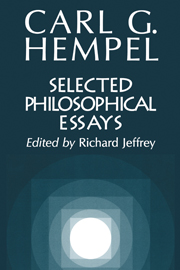Book contents
- Frontmatter
- Contents
- Preface
- Dates
- Introduction
- TRUTH
- PROBABILITY
- METHODOLOGY
- MEMOIRS
- Chapter 13 Rudolf Carnap: Logical Empiricist
- Chapter 14 The Vienna Circle and the Metamorphoses of Its Empiricism
- Chapter 15 Hans Reichenbach Remembered
- Chapter 16 Empiricism in the Vienna Circle and in the Berlin Society for Scientific Philosophy: Recollections and Reflections
- C. G. HEMPEL'S PUBLICATIONS
- Index
Chapter 15 - Hans Reichenbach Remembered
Published online by Cambridge University Press: 05 June 2012
- Frontmatter
- Contents
- Preface
- Dates
- Introduction
- TRUTH
- PROBABILITY
- METHODOLOGY
- MEMOIRS
- Chapter 13 Rudolf Carnap: Logical Empiricist
- Chapter 14 The Vienna Circle and the Metamorphoses of Its Empiricism
- Chapter 15 Hans Reichenbach Remembered
- Chapter 16 Empiricism in the Vienna Circle and in the Berlin Society for Scientific Philosophy: Recollections and Reflections
- C. G. HEMPEL'S PUBLICATIONS
- Index
Summary
Hans Reichenbach's far-ranging and influential contributions to epistemology and the philosophy of science will be acknowledged and appraised in many contexts on the occasion of the one-hundredth anniversary of his birth. The following pages, however, are simply meant to record some personal recollections of Reichenbach as he affected one of his many students.
Reichenbach came to the University of Berlin in 1926, over strong philosophical opposition, but with stronger scientific support, especially by Einstein. I had by then been a student there for a year, after previous studies in Göttingen and Heidelberg. I promptly enrolled in a course with Reichenbach and was startled by his ideas on causality and determinism, which contrasted sharply with what I had been taught earlier, especially in courses on Kant's Critique of Pure Reason. Early on, I told him that I considered the principle of causality as true a priori and thus found it impossible even to imagine that it might be false. With a characteristic smile – and an aside on how limited one's imagination could be – Reichenbach said that evidently I had swallowed Kant's conception hook, line, and sinker. But not to worry: He was confident I would change my mind in light of the arguments he would be presenting. I did indeed change my mind on this subject and on many others; Reichenbach's ways of exploring philosophical issues came to exert a strong influence on the development of my thinking and led me into the arms of empiricism.
- Type
- Chapter
- Information
- Selected Philosophical Essays , pp. 288 - 294Publisher: Cambridge University PressPrint publication year: 2000

